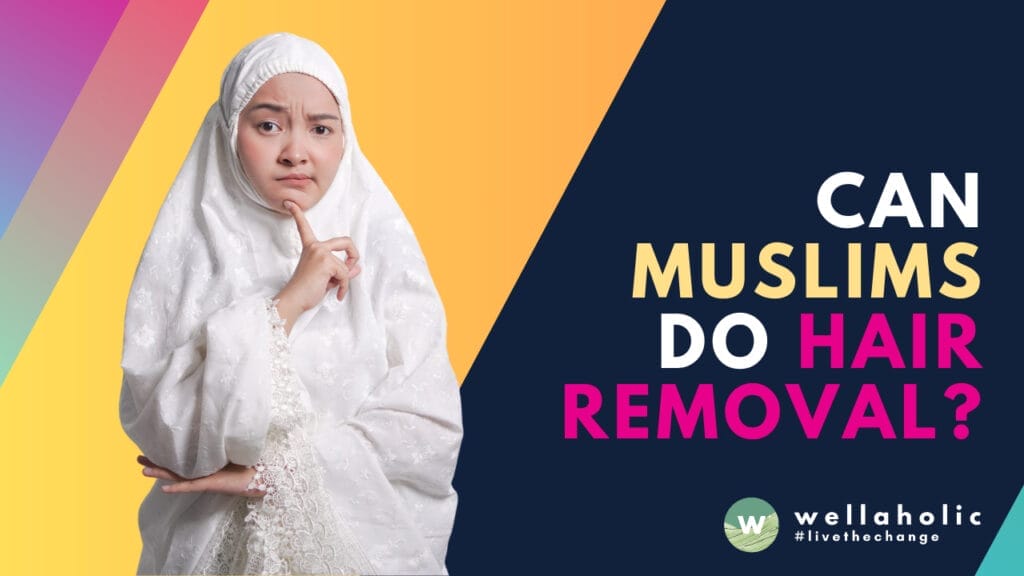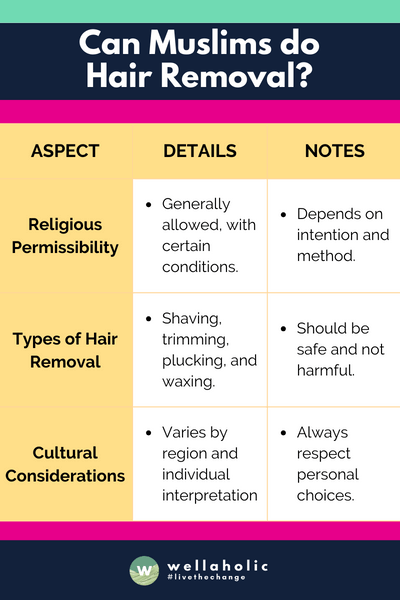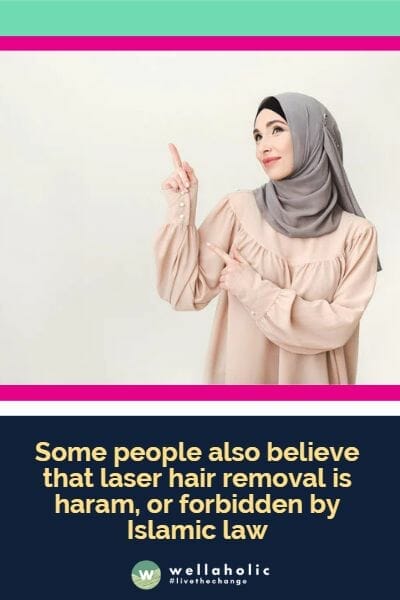
Can Muslims Do Hair Removal?

Can Muslims Do Hair Removal?
Hair removal aligns with Islamic principles of cleanliness and personal grooming.
- ✔️ Encouraged for hygiene and comfort.
- ✔️ Methods like waxing, shaving, or laser are permissible.
- ✔️ Must adhere to modesty guidelines.
- ✔️ Laser hair removal is allowed if Sharia-compliant.
Explore safe, effective hair removal options today!
Book Now
Introduction: Understanding Hair Removal in Islam
As aesthetic professionals, we often encounter questions about the intersection of beauty practices and religious beliefs. One topic that frequently comes up is the permissibility of hair removal in Islam. Is laser hair removal halal or haram?
We’ve had many Muslim customers at Wellaholic ask us this very question. In our years of experience, we’ve learned that the answer isn’t always straightforward. It depends on various factors, including the purpose of hair removal and the specific body areas involved.
In this article, we’ll explore Islam’s stance on hair removal, drawing from our expertise and conversations with Muslim scholars. We’ll provide insights to help you make an informed decision that aligns with your faith and personal grooming preferences.

Islamic Principles on Hair Removal
Sunnah Guidelines
Muslims are encouraged to remove hair in specific areas to maintain cleanliness.
Accepted Methods
Shaving, trimming, waxing, and other hygienic methods are permissible.
Religious Significance
Following these practices is a sign of respect for cleanliness in Islam.


Islamic Principles on Hair Removal
Hair removal is a personal grooming practice that varies among individuals and cultures. In Islam, the permissibility of hair removal is based on the teachings of the Quran and the Hadith. Understanding the religious guidelines and principles regarding hair removal is crucial for Muslim individuals seeking to maintain their personal grooming habits in accordance with their faith.
Halal and Haram Concepts in Hair Removal for Muslims
In Islamic teachings, the permissibility of hair removal is contingent on the method and the part of the body from which the hair is being removed. The Islamic perspective emphasizes the importance of cleanliness and personal grooming, allowing the removal of unwanted hair from certain areas of the body, such as the armpits and the pubic region, through permissible methods.
The Prohibition of Certain Hair Removal Practices in Islam
While hair removal is generally permissible in Islam, there are specific practices that are prohibited. It is haram to remove pubic hair using certain methods like shaving, as this goes against the teachings of Islam. Understanding which hair removal methods are prohibited is essential for Muslim individuals to adhere to their religious principles.
Islamic Perspective on Body Hair Grooming
Islamic teachings provide guidance on body hair grooming, addressing the permissibility and prohibition of certain practices. It is important for Muslim individuals to seek advice from Islamic scholars or religious authorities to ensure that their hair removal practices align with the teachings of Islam and adhere to the principles of halal and haram.

Case Study: Pubic Hair Removal Practices in Muslim Women in North Cyprus
Yayci (2014) conducted a study to evaluate pubic hair removal trends, demographic, social, and sexual features among Turkish Cypriot women in North Cyprus. The study revealed that most Turkish Cypriot women regularly apply pubic hair removal with waxing being the most common method.
The study suggests that the initiation of pubic hair removal is at the age of menarche and is influenced by the mother. The reasons for pubic hair removal were primarily for comfort and prevention of odor, rather than for sexual image or religious reasons (Yayci, 2014).

Modern Hair Removal Methods and Islam
Laser Hair Removal in Islamic Context
When considering hair removal in Islam, the permissibility of laser hair removal is a topic of discussion. Laser hair removal is a modern technique that involves the use of laser technology to remove unwanted hair from the body.
From an Islamic perspective, the permissibility of laser hair removal is subject to the method used and the area of the body being treated. It is important for Muslim individuals considering laser hair removal to seek guidance from knowledgeable religious authorities to ensure that the practice aligns with the principles of halal and haram in Islam.
Traditional Methods of Hair Removal: Waxing, Shaving, and Plucking
In addition to laser hair removal, traditional methods of hair removal such as waxing, shaving, and plucking are common practices among individuals seeking to maintain personal grooming habits. These methods have been used for generations and are often preferred due to their convenience and accessibility.
However, it is important for Muslim individuals to understand the permissibility of these methods in Islam and seek advice from religious authorities to ensure that their grooming practices adhere to Islamic principles.
The Permissibility of Hair Removal for Women in Islam
In Islam, understanding the rules around hair removal for women is key. Islamic teachings offer clear guidelines about what’s allowed and what’s not, especially for women. Muslim women should seek advice via Islamic scholars or religious leaders. This helps them choose hair removal methods that comply with Islamic principles.

Hair Removal Guidelines for Muslim Women
When it comes to hair removal for Muslim women, seeking guidance from Islamic authorities is essential. The permissibility of hair removal in Islam is rooted in the teachings of the Quran and the Hadith. Understanding the religious guidelines is crucial for Muslim women to groom themselves while adhering to their faith.
Expert Fatwas on Hair Removal for Women
Islamic scholars and religious authorities have provided fatwas (religious rulings) on the permissibility and prohibition of hair removal practices for women. These fatwas offer guidance on the acceptable methods and areas of the body from which hair can be removed, ensuring that Muslim women can maintain personal grooming practices in adherence to Islamic principles.
Practices & Standards for Hair Removal in Islamic Culture
In Islamic culture, there are practices and standards that dictate the permissibility of hair removal. Understanding these standards is crucial for Muslim women to navigate their grooming routines. By adhering to Islamic guidelines, women can ensure that their hair removal practices align with the principles of halal and haram.
Pubic Hair and Eyebrow Grooming in Islam
Islamic teachings provide specific guidance on the grooming of pubic hair and eyebrows for women. It is imperative for Muslim women to seek advice from religious authorities to understand the permissible methods of grooming these areas, ensuring that their practices are in accordance with the teachings of Islam.

So, Can Muslims Do Laser Removal?
Muslims can indeed do hair removal, with some scholarly differences in opinion. Most scholars agree it’s permissible to remove unwanted hair from various body parts like underarms, legs, and the pubic area. This aligns with a hadith from Abu Hurairah, where Prophet Muhammad listed five fitrah practices: circumcision, shaving the pubic area, trimming the mustache, plucking the eyebrows, and trimming the nails, as found in Sahih al-Bukhari.
Balancing Tradition and Faith: Can Muslims Do Hair Removal While Respecting Islamic Principles?
However, there are restrictions. Muslims shouldn’t remove hair from their eyebrows or beard. A small amount of excess hair between the eyebrows can be removed. This is based on another hadith, narrated by Ibn ‘Abbas, where Prophet Muhammad expressed disapproval of women who modify their eyebrows, tattoo their face, or make dental alterations for beauty. This narration is recorded in Sunan Abu Dawud.
The intention behind hair removal is also crucial. If it’s for vanity or imitating non-Muslims, it’s discouraged. But for hygiene or medical reasons, it’s acceptable.
For Muslim individuals considering laser hair removal, it’s vital to consult knowledgeable religious authorities. This ensures the procedure aligns with halal and haram principles in Islam.
Frequently Asked Questions (FAQ)
Q: Is hair removal permissible in Islam?
A: Yes, hair removal is permissible in Islam as long as it is not done in a way that is considered haram, such as using methods that cause harm or resemble practices of non-Muslim religions.
Q: Can Muslims use hair removal cream?
A: Yes, Muslims can use hair removal cream as long as its ingredients are compliant with Islamic principles and do not contain any haram substances.
Q: Is laser hair removal permissible in Islam?
A: The permissibility of laser hair removal in Islam can vary based on the method and purpose. It is important to ensure that the procedure is Sharia-compliant and does not cause harm to the body.
Q: Are there specific rules for removing hair from private parts in Islam?
A: Yes, there are guidelines in Islam for the removal of hair from private parts. It is important to follow the teachings of the Prophet and ensure that the method used is compliant with Sharia law.
Q: Can Muslim women remove hair from their eyebrows and head?
A: Yes, Muslim women are allowed to remove hair from their eyebrows and head as long as it is done in a permissible way and does not contradict Islamic guidelines.

Serene Chiam, Aesthetic Director (LinkedIn)
Serene Chiam is the highly skilled Aesthetic Director at Wellaholic, Singapore’s premier aesthetic chain. With over a decade of expertise in the aesthetics industry, Serene brings a wealth of knowledge and experience to her role. She previously served as a Clinical Aesthetics Manager with Laser Clinics Australia, honing her skills in laser hair removal and other advanced treatments. Serene holds a CIDESCO certificate in skincare and a Bachelor of Health Science (Aesthetics) from Torrens University, Australia. Her deep understanding of the latest aesthetic technologies and techniques ensures that Wellaholic’s clients receive the most effective, long-lasting hair removal results. Serene’s passion for helping others feel confident and beautiful shines through in her dedication to providing exceptional care and achieving optimal outcomes for every client.
Contact Serene at [email protected]
GET IN TOUCH
Book Now Pay Later

SHR Permanent Hair Removal with Unlimited Shots
- ⭐ Diode Laser Technology. Developed by Alma Lasers, SHR combines 755nm, 808nm and 1064nm laser wavelengths to target all skin types.
- ⭐ Unbeatable in Value and Quality. Wellaholic’s SHR Unlimited Plans offer a hair removal solution that is unbeatable in both value and quality.
- ⭐ One Price for All Body Parts. Pay just one low price for a complete hair removal experience for all body parts, including unlimited SHR shots.
- ⭐ Permanent Fuss-Free Solution. Say goodbye to the hassle of expensive and ineffective hair removal methods and trust WellaSmooth 3X to deliver a permanent and fuss-free solution for all your hair removal needs.
- ⭐ Award-Winning. Wellaholic’s treatments have been recognized by top beauty publications such as Daily Vanity, Beauty Insider, and Tropika Club Magazine.
- ⭐ Over 2000 Verified Customer Reviews. Wellaholic has over 30 industry awards and over 2000 positive reviews from customers, and >50% are repeat customers.







